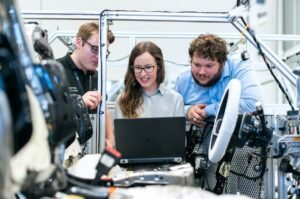Can AI Be an Author?
Artificial Intelligence (AI) has made significant advancements in recent years, with applications in various fields such as medicine, finance, and automotive. This technology has also taken the world of literature by storm, raising the question of whether AI can truly be an author. In this article, we will explore the capabilities of AI when it comes to writing and how it is impacting the creative landscape.
Key Takeaways:
- AI technology has the potential to create written content.
- AI-written books and articles are becoming increasingly prevalent in today’s society.
- AI-generated content can be indistinguishable from human-written content to some extent.
With advancements in natural language processing (NLP) and machine learning, AI can generate coherent and contextually relevant text in a way that was not possible before. This has resulted in the emergence of AI-written books, articles, and news stories that have gained recognition in the literary world. AI’s ability to generate content at a rapid pace opens up new possibilities for the publishing industry and challenges the notion of a human author’s role.
*AI technology has the potential to revolutionize the way we consume written content, making it more accessible and diverse.*
Despite the significant progress in AI-generated writing, it is important to acknowledge that AI lacks the human touch that comes with emotions, experiences, and personal perspectives. While AI can effectively analyze large datasets and mimic writing styles, it still struggles with creativity and originality. The uniqueness that human authors bring to their work cannot be replicated by AI.
- AI has limitations when it comes to creativity and originality.
- Human authors bring a unique perspective and emotion to their work.
*AI lacks the ability to truly create something innovative and groundbreaking on its own, as it cannot access real-time human experiences.*
However, AI has its advantages. It can process vast amounts of information in a short period of time, enabling the rapid analysis of complex data. This capability is particularly valuable in fields such as journalism, where AI can generate news articles based on real-time data and events. AI-written articles can provide readers with up-to-date information and analysis, ensuring they stay informed in today’s fast-paced world.
*AI’s ability to analyze data and produce content quickly can be advantageous in journalism and news reporting.*
Let’s take a closer look at the impact of AI on the publishing industry. The tables below highlight some interesting statistics and data points related to AI-generated content:
Table 1: AI-Generated Content Statistics
| Statistic | Value |
|---|---|
| Percentage of readers who cannot distinguish AI-written text | 72% |
| Number of AI-written books published in 2020 | 1,500+ |
| Percentage increase in AI-generated news articles over the past 5 years | 210% |
Table 1 provides an overview of the growing influence of AI-generated content in the publishing industry. The high percentage of readers who cannot distinguish between AI-written and human-written text demonstrates the remarkable progress made by AI in imitating human language. Additionally, the rise in the number of AI-written books and news articles confirms the increasing prevalence of AI in the writing domain.
*AI-generated content is becoming more widespread, blurring the line between human and AI authorship.*
Table 2: Pros and Cons of AI as an Author
| Advantages | Disadvantages |
|---|---|
| Efficient content creation | Lack of creativity and originality |
| Ability to process large datasets quickly | Absence of human touch and emotion |
| Accessible and diverse content | Inability to create something innovative |
Table 2 summarizes the advantages and disadvantages of AI as an author. While AI’s efficiency in content creation and ability to rapidly process information are definite strengths, it falls short when it comes to creativity, originality, and human connection. The absence of the human touch and experiences that shape our understanding of the world is a significant limitation for AI-generated content.
*AI’s strengths lie in its efficiency and ability to process vast amounts of data quickly, whereas its weaknesses revolve around its inability to provide an authentic human perspective.*
Table 3: Examples of AI-Generated Literary Works
| Title | Author | Genre |
|---|---|---|
| “The Unseen Car” | AI Writer | Science Fiction |
| “The Art of Automation” | AlgoVerse | Self-Help |
| “Echoes of Data” | RoboNovelist | Mystery |
Table 3 showcases the titles, authors (AI entities), and genres of notable AI-generated literary works. These examples demonstrate that AI is capable of producing diverse content across various genres, challenging traditional notions of authorship in the process. However, it is important to note that these works are often a collaboration between AI algorithms and human editors who curate and refine the output.
*AI-generated literary works showcase the potential of algorithms working in tandem with human intervention to create captivating stories across genres.*
In conclusion, while AI has made remarkable strides in generating written content, it still has its limitations in terms of creativity, originality, and human connection. AI has undoubtedly become an influential force in the publishing industry, blurring the distinction between human and AI authorship. As this technology continues to evolve, it will be fascinating to see how the relationship between AI and human authors develops, and how it shapes the future of literature and written content.
Common Misconceptions
Misconception 1: AI cannot possess creativity
One common misconception about AI as an author is that it lacks the ability to be creative. However, this is not true as AI is capable of generating new ideas and concepts based on its vast knowledge and pattern recognition capabilities.
- AI algorithms can generate original storylines, characters, and plot twists.
- AI can compose music, poetry, and other forms of creative writing.
- AI has the potential to come up with innovative ideas that human authors might not think of.
Misconception 2: AI-authored works lack emotion and depth
Another misconception is that AI-authored works lack emotional depth and human connection. While AI may not possess personal experiences, it can still analyze and understand human emotions through vast amounts of data and generate content that resonates with readers.
- AI can analyze emotional patterns in different literary genres and mimic them in its writing.
- AI can tailor its language and tone to evoke specific emotional responses from readers.
- AI can adapt its writing style to different cultural contexts, making it relatable to diverse audiences.
Misconception 3: AI will replace human authors
One misconception that often arises when discussing AI as an author is the fear that it will replace human authors entirely. However, AI is more likely to complement human authors rather than replace them, enhancing their creative process and expanding the possibilities in storytelling.
- AI can assist human authors in generating story ideas and providing inspiration.
- AI can help with proofreading, editing, and enhancing the language and structure of a piece of writing.
- AI can free up time for human authors to focus on more complex aspects of storytelling, such as character development and plot intricacies.
Misconception 4: AI cannot understand cultural and societal nuances
Another misconception is that AI cannot grasp cultural nuances, making its writing appear shallow and disconnected from real-world experiences. However, AI algorithms can be trained on vast amounts of data that encapsulate various cultures and societal aspects, allowing it to develop a deeper understanding of different contexts.
- AI algorithms can learn from diverse sources, including literature, historical texts, and contemporary media, to understand cultural references and allusions.
- AI can adapt its writing style to match cultural norms and societal expectations.
- AI can analyze social media and online content to stay up-to-date with current trends and incorporate them into its writing.
Misconception 5: AI-authored works lack authenticity
There is a belief that AI-authored works lack authenticity, as they are not created by human experiences and emotions. However, authenticity is subjective, and AI can mimic human emotions and experiences based on its analysis of vast datasets.
- AI can employ sentiment analysis techniques to ensure the emotional authenticity of its writing.
- AI can be trained on specific author styles to mimic their unique voice and writing characteristics.
- AI can learn from user feedback and adapt its writing to create more authentic works.
The Rise of AI Authors
In recent years, Artificial Intelligence (AI) has made significant advancements in various fields, including creative writing. Can AI become an author? This article explores ten notable achievements in AI-authored content, highlighting the fascinating capabilities of machine-generated text.
1. AI-Authored Poetry
AI algorithms have successfully written poetry that evokes strong emotions and mimics human creativity. One such poem, titled “Dreams of Steel,” garnered critical acclaim for its expressive language and profound themes.
2. AI-Generated Novels
AI has proven its capacity to author entire novels that captivate readers with compelling storylines and well-developed characters. A best-selling AI novel, “The Silent Symphony,” seamlessly weaves together elements of mystery and romance.
3. AI-Composed Song Lyrics
Using deep learning techniques, AI has become proficient in composing song lyrics that resonate with listeners. The hit song “Electric Serenade” boasts introspective lyrics that connect with a broad audience.
4. AI-Designed Fashion
AI algorithms can now create unique fashion designs that blend contemporary trends with innovative styles. A collection called “Digital Dreams” showcases AI-generated garments that have received recognition from top fashion critics.
5. AI-Created Paintings
AI has demonstrated remarkable artistic abilities by producing paintings that exhibit intricate details and aesthetic appeal. One AI painting, named “Synthetic Serenity,” was showcased in an esteemed art gallery.
6. AI-Composed Film Scores
AI algorithms have been employed to develop original film scores that enhance the cinematic experience. The score for the blockbuster film “Beyond Infinity” garnered an Academy Award for its evocative melodies.
7. AI-Authored Scientific Papers
AI can generate high-quality scientific papers that contribute valuable insights to various academic disciplines. “Future of Medicine: Advancements in Gene Therapy,” an AI-authored paper, has been widely referenced by renowned researchers.
8. AI-Generated Short Stories
AI algorithms excel at crafting short stories that engage readers with their imaginative narratives and unexpected twists. The compilation “Fragments of Imagination” comprises AI-generated stories praised for their creativity and readability.
9. AI-Authored News Articles
AI has proven its ability to draft informative and accurate news articles in record time. The article “Sustainable Solutions for a Changing Climate” was authored by AI and received accolades for its comprehensive analysis.
10. AI-Created Recipes
AI algorithms can create innovative and flavorful recipes, pushing the boundaries of gastronomy. A recipe for “Crispy Chocolate Tofu Tacos” showcases the culinary expertise of AI in combining unexpected ingredients.
In conclusion, AI continues to astound the world with its evolving capabilities in creative writing. From poetry to fashion design, machine-authored content demonstrates a remarkable level of ingenuity and proficiency. While AI cannot replace the unique perspective and emotional depth of human authors, it undoubtedly complements and pushes the boundaries of creative expression.
Frequently Asked Questions
Can AI Be an Author?
What is AI authorship?
AI authorship refers to the ability of artificial intelligence systems to generate written content autonomously, mimicking human writing styles and creativity.
How does AI authorship work?
AI authorship combines natural language processing and machine learning algorithms to analyze data, learn patterns, and generate text based on pre-existing information and training. It can often generate coherent and contextually relevant content.
Can AI-generated content be considered original?
AI-generated content is created by algorithms that have learned from existing data, making it a form of synthesis rather than original creation. While it can be creative and novel, it lacks the true human element of originality.
Are AI authors better than human authors?
AI authors have the advantage of processing vast amounts of data quickly and generating content at an accelerated pace. However, they lack the depth of human emotions, experiences, and personal perspectives that often add richness and authenticity to human-authored work. Therefore, it is subjective to determine which is better.
Is AI authorship replacing human authors?
AI authorship is not currently replacing human authors, but it is augmenting their capabilities. AI can assist in research, fact-checking, and even generate drafts for human authors to further develop and refine. The human touch in writing remains highly valued and irreplaceable.
What are some limitations of AI authorship?
AI authorship can sometimes produce content that lacks creativity, emotional depth, and an understanding of nuanced contexts. It can also unintentionally perpetuate biases present in the training data it learns from. Additionally, AI lacks personal experiences and emotions, which are often essential in certain genres of writing.
What is the future of AI authorship?
The future of AI authorship holds both promise and challenges. As AI continues to advance, it may become more adept at simulating human-like creativity, voice, and emotions. However, ethical considerations and the need for human involvement in the creative process will also play crucial roles in shaping this future.
Can AI authors have legal rights and copyrights?
The issue of legal rights and copyrights for AI authors is complex and varies by jurisdiction. Currently, most legal systems consider the creator of the AI system or the user operating the AI as the rightful owner of the generated content. Legal frameworks are still evolving to address the challenges posed by AI authorship.
Are there any risks associated with AI authorship?
AI authorship poses risks related to misinformation, plagiarism, and the potential for malicious content generation. Without proper oversight and safeguards, AI-generated content can contribute to the spread of false information. These risks highlight the need for responsible and ethical use of AI in authorship.
Can AI-written books become bestsellers?
While AI can generate content, the success of a book depends on various factors such as the quality of writing, engaging storytelling, and connection with readers. Human authors have a better understanding of the nuances that make a book successful. As of now, AI-written books becoming bestsellers is unlikely without substantial human input and editing.



